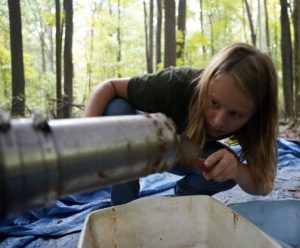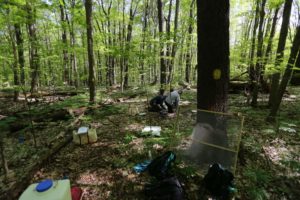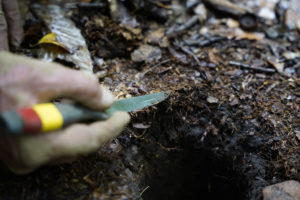Celebrating World Soil Day
 It’s World Soil Day! Did you know that Allegheny College has a long history of teaching and conducting research on soils and the environment?
It’s World Soil Day! Did you know that Allegheny College has a long history of teaching and conducting research on soils and the environment?
“Without soils, there’d be no food or forests,” says Eric Pallant, Christine Scott Nelson ’73 Endowed Professor of Environmental Science & Sustainability (ESS). “Which is why we need to stop treating soil like dirt!”
Although soil is often referred to as dirt, soil is a living resource, filled with insects, invertebrates, protozoa, nematodes, earthworms, bacteria, and fungi.
Pallant is the first Allegheny professor to study the effects of acid rain on soils in the College’s region. He has also published on the linkage between soil health and sustainable agriculture, conducting research at the world-renowned Rodale Research Institute. “Understanding humankind’s relationship to soil is critical to our efforts to develop approaches to sustainable agriculture,” Pallant says.
Pallant produced a seminal report on soils at Allegheny’s Bousson Environmental Research Reserve. He also developed the immensely popular course Soil to Plate, which he often teaches with ESS Associate Professor and Chair Beth Choate, who is trained in agricultural entomology. Choate and her students have also studied effects of acid rain on soil organisms.
 In addition, Matthew Venesky, associate professor of biology and director of Allegheny Forests, has recently initiated, with students, a long-term study of effects of acid rain-affected soils on salamanders, which are currently undergoing a global decline. Other ESS researchers have been heavily involved in long-term soil studies at Bousson. For example, Allegheny’s DIRT (Detritus Input and Removal Treatments) Experiment was the second experiment established in a network of U.S. and international collaborators who examine the role of forest soils in mitigating climate change.
In addition, Matthew Venesky, associate professor of biology and director of Allegheny Forests, has recently initiated, with students, a long-term study of effects of acid rain-affected soils on salamanders, which are currently undergoing a global decline. Other ESS researchers have been heavily involved in long-term soil studies at Bousson. For example, Allegheny’s DIRT (Detritus Input and Removal Treatments) Experiment was the second experiment established in a network of U.S. and international collaborators who examine the role of forest soils in mitigating climate change.
That network now includes eight sites in North America and Europe, and has spurred the creation of another dozen such experiments worldwide. ESS Professor Richard Bowden set up Allegheny’s plots in the experiment in 1991 and continues to work with students on the ongoing research.
 Myrna Simpson, professor of physical and environmental sciences at the University of Toronto Scarborough, is collaborating with Allegheny researchers. “The DIRT experiment at Bousson and Allegheny College is a critical part of the international group of scientists who are examining long-term changes in litter quality and quantity on forest ecosystems,” Simpson says. “My group at the University of Toronto has partnered with Allegheny College to study these processes using our combined techniques, thereby providing a broader appreciation for how forest soils are impacted by a changing world.”
Myrna Simpson, professor of physical and environmental sciences at the University of Toronto Scarborough, is collaborating with Allegheny researchers. “The DIRT experiment at Bousson and Allegheny College is a critical part of the international group of scientists who are examining long-term changes in litter quality and quantity on forest ecosystems,” Simpson says. “My group at the University of Toronto has partnered with Allegheny College to study these processes using our combined techniques, thereby providing a broader appreciation for how forest soils are impacted by a changing world.”
The College also works to ensure the health of soils on campus. During autumn, fallen leaves are mowed into the grass, thus returning nutrients back to the soil. Additionally, Allegheny uses the compost facility to make a soil bacteria and fungi extract that is added to the lawns to enhance soil health, thus eliminating the need for environmentally damaging pesticides and fertilizers.